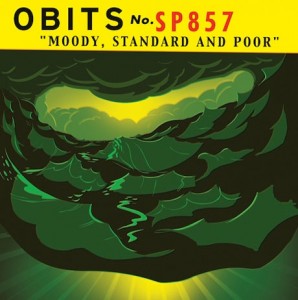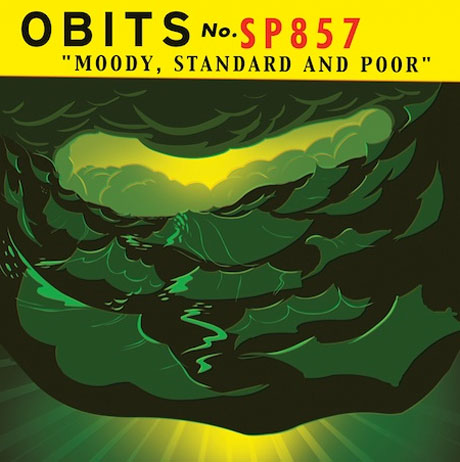Date Posted: April 12, 2011
Print Edition: April 8, 2011
By Nick Ubels (Online Editor) – Email
 A defiant snare hit splits open “You Gotta Lose,” the first track from the Obits’ fiery sophomore record, Moody, Standard and Poor. Fuelled by a relentlessly propulsive rhythm section consisting of bassist Greg Simpson and drummer Scott Gursky, the song makes quick work of summing up the band’s M.O.: primal, deceptively simple rock and roll. To that end, the Obits’ latest offering is a rousing success.
A defiant snare hit splits open “You Gotta Lose,” the first track from the Obits’ fiery sophomore record, Moody, Standard and Poor. Fuelled by a relentlessly propulsive rhythm section consisting of bassist Greg Simpson and drummer Scott Gursky, the song makes quick work of summing up the band’s M.O.: primal, deceptively simple rock and roll. To that end, the Obits’ latest offering is a rousing success.
An album that demands to be played loud to be fully appreciated, Moody effectively transports listeners to 1 o’clock at some cramped downtown dive bar haunted by the ghosts of proto-punk acts few patrons are old enough to remember. It doesn’t exactly sound live so much as it feels live. The production is cavernous and menacing, hinting at something vaguely sinister lurking behind every guitar riff.
That anxiety is given a voice in lyrics like, “Don’t everything baby / look better in the morning?” from “Everything Looks Better In The Sun,” that connect precisely because they opt for the visceral over strained originality.
What is perhaps most remarkable about the New York quartet’s latest release is how well the band uses negative space to foster an underlying sense of urgency; the listener is left with the impression of tremendous power under great restraint. Although the group inhabits a musical universe where less is most definitely more, it would be a mistake to call the Obits minimalists. Despite their clean sound, tightly focused composition, and lack of overdubs, there’s something too aggressive about the band’s music to abide such a label.
Main vocalist Rick Froberg – a veteran of post-hardcore acts Drive Like Jehu and Hot Snakes – has never sounded as melodic as he does on the opening verse of “Beggin’ Dogs,” and it suits him well. Throughout the record, Froberg’s half-shouted vocals cut nicely across the clear-eyed and controlled arrangements that draw on the taut, punchy rhythm section of the Feelies as much as they do the blues-infused mania of the Stooges.
Simplicity is a virtue for the Obits, but not for any lack of technical proficiency. Froberg and bandmate Sohrab Habibion’s dynamic guitar work is even more refined here than on the band’s debut, 2009’s I Blame You. Their duelling, echo-laden guitar interplay, at its best, brings to mind Television’s one-two punch of Tom Verlaine and Richard Lloyd. Nowhere is this more evident than on mid-album surf rock rave-up “Spot the Pikey,” where Froberg and Habibion freewheelingly spiral in and out of interlocking guitar lines.
Tone is king throughout the record, and the Obits’ guitars sound like they’re pouring out of two clean-channel Fender amps played loud and pushed to their breaking point: jangly and resonant with a spine-tingling edge of natural distortion.
While Moody, Standard and Poor may not exactly rewrite the book on indie rock, it doesn’t sound like that’s what the Obits set out to do in the first place. This scrappy, yet economical collection is a thrillingly cathartic testament to the enduring viability of no frills, blues-driven garage punk.


